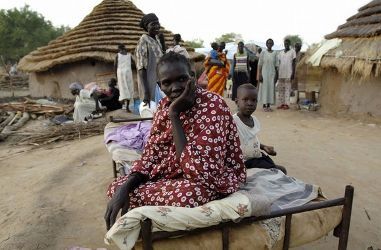Sudan warns against referring Abyei to UN Security Council
December 12, 2012 (KHARTOUM) – Sudan foreign minister warned that referring Abyei file to the United Nations Security Council (UNSC) will complicate the issue and will lead to a new conflict in the region.

Despite Khartoum’s rejection, the regional body decided on 24 October to endorse a proposal made by the mediation team providing to hold a referendum in October 2013 without the participation of the Misseriya pastoralists.
The African council further decided to refer definitively the proposal to the Security Council if the two parties fail within six weeks to reach a compromise based on what the mediation offered. No meeting was held during the past period between the two sides.
Karti informed Xiaoguang that Sudan rejects the proposal which enables the Ngock-Dinka to annex the region to the newly independent South Sudan, stressing it will not accept a solution imposed by any foreign institution as long as it goes against its national interests and the interests of its people.
The minister however said they accept to resolve the conflict within the African framework.
Following the issuance of the AUSPC decision over Abyei on 24 October, Sudan accused the United Sates and some Western countries of lobbying behind the scene for the referral of the proposal to the UNSC telling they can force Khartoum to accept it under Chapter Seven of the UN Charter.
According to the minister, the proposed referendum goes against the foundations of the solution, already supported by the international community, included in Abyei Protocol and Abyei Referendum Act, which are adopted by a parliament composed of the parties to the Comprehensive Peace Agreement before the secession.
He added, according to the official news agency SUNA, that the proposal also violates the 20 June 2011 agreement on Temporary Arrangements for the Administration and Security of the Abyei Area.
Sudan already sought the support of the Russian Republic which is a permanent member of the Security Council and has the power to veto any decision that the 15-member body may take.
Russian and Sudanese officials tackled the issues in different meetings in Khartoum and Moscow.
Last week Nafie Ali Nafie after touring key African countries to explain Sudan’s position on the issue travelled to Moscow where he signed different economic deals and discussed Abyei with foreign minister Sergei Lavrov.
The meeting with the Chinese ambassador is seen as a formality that the foreign minister thought important to fulfil but Sudan, according to different sources, does not expect the support of Beijing in this issue due to its oil investments in South Sudan.
Ambassador Xiaoguang reiterated China’s keenness to establish fruitful cooperation with both countries and expressed its wishes that peace prevails in the region.
According to SUNA, the Chinese diplomat added that Beijing encourages the two parties to reach a compromise within the African framework without external intervention that may interfere with efforts to reach a solution.
Juba says the two countries have discussed the issue in vain since several years.
South Sudan campaigned in favour of the African proposal and delegations visited different countries including Russia to convince its leader to support Mbeki’s proposal.
(ST)
